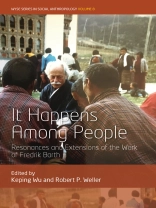Written by eleven leading anthropologists from around the world, this volume extends the insights of Fredrik Barth, one of the most important anthropologists of the twentieth century, to push even further at the frontiers of anthropology and honor his memory. As a collection, the chapters thus expand Barth’s pioneering work on values, further develop his insights on human agency and its potential creativity, as well as continuing to develop the relevance for his work as a way of thinking about and beyond the state. The work is grounded on his insistence that theory should grow only from observed life.
Table des matières
List of Figures
Introduction
Robert P. Weller and Keping Wu
Chapter 1. Humility First: Fredrik Barth in His Own Words – and Mine
Unni Wikan
Chapter 2. Transacting Knowledge and Value: Fredrik Barth and the Tactics of Mutual Incomprehension
Michael Herzfeld
Chapter 3. Cosmologies in the Remaking: Variation and Time in Chinese Temple Religion
Robert P. Weller
Chapter 4. Building Infrastructure and Making Boundaries in Southwest China
Keping Wu
Chapter 5. On Nomads of South Persia
Thomas Barfield
Chapter 6. The Language of Trust and Betrayal
Gunnar Haaland
Chapter 7. Khan and Sufi: Two Types of Authority in Swat, Northern Pakistan
Charles Lindholm
Chapter 8. Values and the Value of Secrecy: Barthian Reflections on Values and the Nature of Mountain Ok Social Process
Joel Robbins
Chapter 9. Paradigm Change in Chinese Ethnology and Fredrik Barth’s Influence
Ke Fan
Chapter 10. An Overall Generative Approach: Fredrik Barth’s Contribution to Anthropological Research and Writing
Chee-Beng Tan
Afterword: A Rooted Cosmopolitan Remembered
Ulf Hannerz
Index
A propos de l’auteur
Keping Wu is Associate Professor at the Department of China Studies in Xi’an Jiaotong-Liverpool University. Trained as an anthropologist, she had previous teaching and research positions at Sun Yat-sen University, National University of Singapore, and The Chinese University of Hong Kong. She has recently published Religion and Charity: The Social Life of Goodness in Chinese Societies, co-authored with Robert P. Weller and Julia Huang (Cambridge, 2018).












